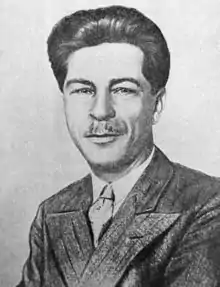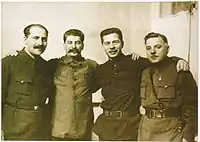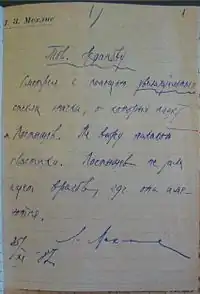Pavel Postyshev
Pavel Petrovich Postyshev (Russian: Па́вел Петро́вич По́стышев; 18 September [O.S. 6 September] 1887 – 26 February 1939) was a Soviet politician, state and party leader and party publicist.
Pavel Postyshev Па́вел Петро́вич По́стышев | |
|---|---|
 | |
| First Secretary of the Kyiv Regional Committee (previously of Kyiv Gubernatorial Committee and Kyiv District Committee) of the Communist Party of Ukraine | |
| In office 10 June 1934 – 16 January 1937 | |
| Preceded by | Nikolai Demchenko |
| Succeeded by | Sergey Kudryavtsev |
| In office 13 November 1924 – November 1926 | |
| Preceded by | Lavrentiy Kartvelishvili |
| Succeeded by | Fyodor Kornyushin |
| Head of the Organizational-Instruction Department of the Central Committee | |
| In office 1932 – January 1933 | |
| Preceded by | Joseph Meerzon |
| Succeeded by | Vladimir Polonsky |
| Candidate member of the 17th Politburo | |
| In office 10 February 1934 – 14 January 1938 | |
| Full member of the 17th Secretariat | |
| In office 13 July 1930 – 10 February 1934 | |
| Full member of the 16th Orgburo | |
| In office 13 July 1930 – 10 February 1934 | |
| Personal details | |
| Born | Pavel Petrovich Postyshev 18 September [O.S. 6 September] 1887 Ivanovo, Russian Empire |
| Died | 26 February 1939 (aged 51) Moscow, Russian SFSR, Soviet Union |
| Political party | RSDLP (Bolsheviks) (1904–1918) Russian Communist Party (1918–1938) Communist Party of Ukraine |
| Signature |  |
Career
Postyshev was born in Ivanovo-Voznesensk in Vladimir Governorate in to the family of a weaver.
He was a member of the Russian Social-Democratic Labour Party from 1904 and became a of its member of the Bolshevik faction in Siberia. In 1923 he was reassigned from his position in the Far Eastern Republic to supervise organization of the Communist Party committee in Kiev Governorate (guberniya) in central Ukraine. In 1925 Postyshev became secretary of the Central Committee of the Communist Party (Bolshevik) of Ukraine, or CP(b)U. In 1926–30 he became a member of the Politburo and Organizational Bureau of Ukraine's Communist Party.
As secretary of the Kharkiv Oblast and city Party committees, Postyshev organized the purge of Trotskyists and Ukrainian national-communists as well as industrialization and collectivization campaigns in the region. In July 1930 he was promoted to the office of secretary of the Central Committee of the All-Union Communist Party (Bolshevik) in Moscow and put in charge of propaganda and organization.

In January 1933 Postyshev was once again sent to Ukraine as Stalin's personal representative, along with thousands of political appointees from Russia. Upon Postyshev's arrival in Ukraine he was elected second secretary of the Central Committee of the Communist Party (Bolshevik) of Ukraine and first secretary of the Kharkiv city and Kharkiv Oblast Party organizations. From July 1934 to January 1937 he was in charge of the Kyiv Oblast Party organization. As second secretary he was nominally subordinate to First Secretary Stanislav Kosior, but his appointment by Stalin effectively gave him supreme power. Postyshev's mission in Ukraine was to eliminate any remaining opposition to Stalin by purging all traces of "nationalist deviation" from the Party, to end the cultural policy of Ukrainization, and to bring collectivization to completion at any cost.[1]
A prominent scapegoat was Mykola Skrypnyk, the director of Ukrainization, who was removed from his post within a month (he later shot himself rather than face a show trial).[2] The end of Ukrainization was accompanied by an attack on cultural institutions in Ukraine and the new Soviet intelligentsia. Under Postyshev, thousands of authors, scholars, philosophers, artists, musicians and editors were exiled to labour camps, executed or simply disappeared. Many others avoided being denounced by working according to Moscow dictates. "Nests of nationalist counter-revolutionaries" like the commissariats of education, agriculture, and justice, newspapers, journals, encyclopedias and film studios were purged.[3] Over 15,000 officials were eliminated on charges of "nationalism."[3]
The Ukrainian Communist Party was also targeted. In a prelude to the Great Purge, almost 100,000 members were expelled during Postyshev's first year in Ukraine, and a further 168,000 through 1938.[4] Postyshev wrote in his report that the majority were exiled or shot.[3] The highest ranking were paraded through elaborate show trials. As the purges progressed after 1933, affecting millions throughout the Soviet Union, Postyshev's crackdown spread beyond perceived "Ukrainianizers," "nationalists," and opponents of collectivization. Eventually it came to include the liquidation of entire classes such as kulaks, priests, people who had been members of anti-Bolshevik armies, and even ethnic Ukrainians who had travelled abroad or immigrated from Galicia.[5]

Postyshev criticized the Ukrainian Communists for their "lack of Bolshevik vigilance" in Stalin's systematic enforcement of increased grain quotas. His party activists conducted a brutal campaign through farms and homes, searching for suspected hiding places and confiscating every bit of grain, with disregard for the starvation they encountered. Millions died in the famine of 1932–33.[6]

After the famine, Postyshev was removed from Ukraine and appointed first secretary of the Kuibyshev Oblast Party Committee.[7] There during the Great Purge, he launched an extensive hunt for "enemies of the people". He was noteworthy for promoting the practice of the New Year tree after publishing a famous letter in Pravda on 28 December 1935, in which he asked for trees to be installed in schools, children's homes, Young Pioneer Palaces, children's clubs, children's theaters and cinemas.
Downfall
Despite being a fanatical fighter against Trotskyists through his career, soon he was accused of being Trotskyist himself and was arrested on February 26, 1938.[8] His arrest came after he was denounced by Lev Mekhlis who feared that Postyshev's repression might affect him.[9] He was shot at Kuibyshev on February 26, 1939.[10] Nikita Khrushchev, along with Vyacheslav Molotov and Nikolai Yezhov, were sent to take over Postyshev's post in Ukraine. Khrushchev had to be appointed by Moscow; he could not be elected because, after Postyshev's removal, the entire Central Committee of the CP(b)U "had been purged spotless," according to Khrushchev.[11] His wife and son were later executed, after Molotov added his wife's name to a death list.
Legacy
A railway station which eventually became the city of Pokrovsk was briefly (1934–1938) named Postyshevo after him.
Postyshev is known for reviving the New Year tree tradition in the Soviet Union. A letter from Postyshev published in Pravda on December 28, 1935 calls for the installation of New Year trees in schools, children's homes, Young Pioneer Palaces, children's clubs, children's theaters and cinemas.[12]
Postyshev was rehabilitated in 1956 by Nikita Khrushchev.
In January 2010, a Ukrainian Court of Appeal accused Postyshev, Josef Stalin, Vyacheslav Molotov, Lazar Kaganovich, Stanislav Kosior and other Soviet officials of organizing a man-made famine in Ukraine in 1932–33 (known as Holodomor) but quashed criminal proceedings against them due to their deaths.[13]
References
- Magocsi, Paul Robert (1996). A History of Ukraine. Toronto: University of Toronto Press. ISBN 0-8020-0830-5.
- Subtelny, Orest (1988). Ukraine: A History, 1st edition, Toronto: University of Toronto Press. ISBN 0-8020-8390-0.
- Paul Robert Magocsi (1996), p 567, Subtelny (1998), p 418.
- Magocsi (1996), p 567, Subtelny (1998), p 419.
- Subtelny (1988), p 419.
- Magocsi (1996), p 567–68, Subtelny (1988), p 419.
- Magocsi (1996), p 567, Subtelny (1988), p 420–21.
- Subtelny (1988), p 414.
- Subtelny (1998), p 420.
- History of Military Parades On Red Square on YouTube. Postyshev story on 25:00.
- Валерий ЕРОФЕЕВ. "Несгибаемый большевик". Волжская коммуна.
- Magocsi (1996), p 570.
- Magocsi (1996), p. 570, Subtelny (1998), p 420.
- Karen Petrone, Life Has Become More Joyous, Comrades: Celebrations in the Time of Stalin, Indiana University Press, 2000, ISBN 0-253-33768-2, Google Print, p.85
- Kyiv court accuses Stalin leadership of organizing famine, Kyiv Post (January 13, 2010)
External links
| Wikimedia Commons has media related to Pavel Postyshev. |
- Postyshev, Pavel entry in the Encyclopedia of Ukraine